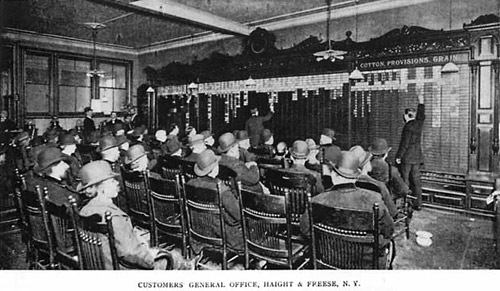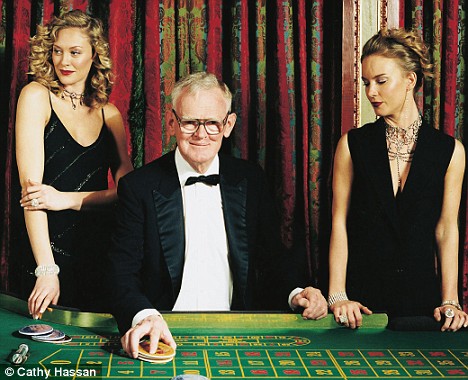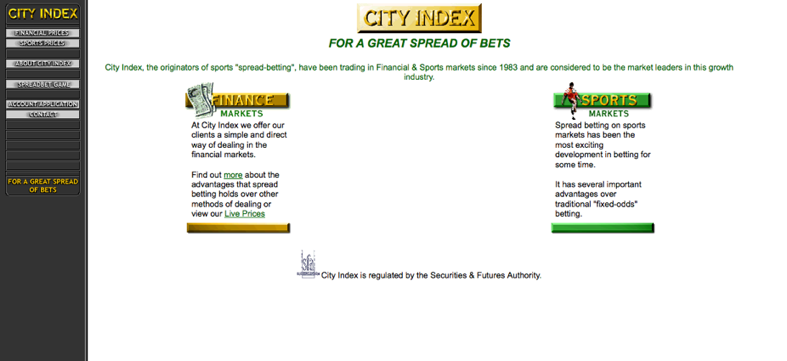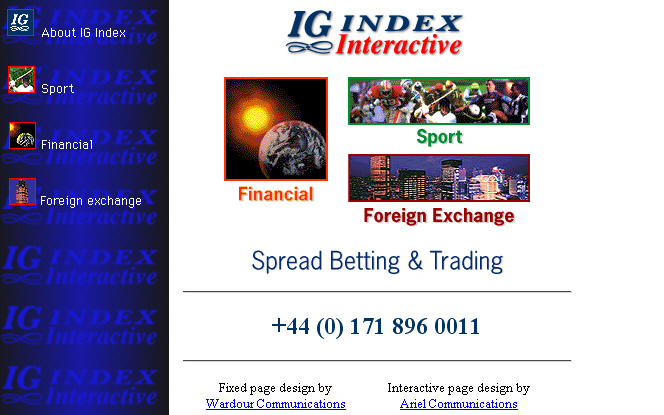Back in Wykoff and Livermore days you did not need a stock brokerage account to trade stocks. In fact, you never had to buy or own a single share of stock - ever!
Some of the major Wall Street firms started out as bucket shops. When you hear the term bucket shop today it means a stock broker that sells pump and dump stocks in a high pressure operation. The term meant something different in the old days. If you walked into a bucket shop in the early 1900s it would look like a mini stock exchange. Blackboards with stock symbols and prices covered the walls, and clerks, usually teenagers looking to get into the business, scurried around reading a clankity-clank ticker tape and updating the prices on the boards.
 |
You could walk into a bucket shop off the street and after making a deposit or otherwise establishing your bona fides you could spend the next several minutes or hours betting on the price movement of Union Pacific, and dozens of other NYSE stocks. You could buy or sell or sell short anytime you wanted. At the end of the day you collected your money or kissed it goodbye and received a hearty invitation from the shop owner to come back tomorrow, as the case may be.
You never saw a stock certificate and the shop owner didn't either. You were trading on the price movement only. Bucket shops were eventually outlawed. I suspect more from the growing political influence of the Wall Street firms than anything else.
Is spread betting as old as the City itself? Certainly not! It all started back in 1974. At that time it was illegal for British citizens to trade gold purely for speculative purposes, so Stuart Wheeler, the founder of IG Group, hit upon the idea of allowing people to trade the price of gold as an index.
At the time Stuart Wheeler started making a market to his friends on the price of gold. Every week, in those days, a select group of people met in New Court, at the offices of N.M. Rothschild, the merchant bankers, to 'fix' the prices at which gold bullion would be bought or offered for sale by the firms that dealt in the metal. When they had agreed on the prices they announced the result to the market, and that became the basis on which gold would be traded until the next 'fix'. Wheeler made a 'buy' and a 'sell' price on where he thought the next 'fix' would be set.
Those who thought that the price of gold would be above his placed a buy bet, those who thought the price would be below placed a 'sell' bet. This is how the 'Investors Gold Index' was born. Back then the Bank of England objected to the company trading under that name so it was quickly abbreviated to IG Index (International Gold), which was the forerunner of all the spread betting bookmakers today.
Such trading was a complete innovation in those days, but the amount of interest it generated in such a new market encouraged Wheeler to expand and widen the choice of instruments on which clients could bet.
 |
Wheeler dealer: Tycoon Stuart Wheeler made his fortune with a spread betting company.
Spread Betting started in 1974. A young unemployed stock broker by the name of Stuart Wheeler had a brainwave that started people trading on gold prices. Stuart Wheeler's idea was to create an index that would give investors the opportunity to bet on the movement of gold, without having to actually buy or sell the physical commodity in the market. This new, innovative company was baptized Investors Gold Index - until the Bank of England objected to it trading under that name and it became IG Index. A short while later IG extended the product range to include foreign exchange and commodities. That you might say was the thin end of the wedge.
Boosted by the economic boom, other spread betting providers started to appear in the 1980s. During this period the spread betting market continued to grow, however the market was still restricted to a very narrow segment of the population. One of the problems at the time was that the spread betting companies only made prices for currencies, commodities, options, and a few major indices - markets not known to Joe Public and thereby only few professional investors were willing to bet on the direction of these markets. It is worth noting here that the general public were used to investing in stocks and bonds and spread betting at the time was still uncharted territory.
The lack of technology during these years also made trading difficult for both investors and the companies themselves. The average investor found it difficult to acquire sufficient information on these markets in order to make a prediction on the market direction and second the technology was not sufficiently advanced for providers to offer spreads on a multitude of markets. Spread betting is also a fast-moving instrument; spreads are continuously being created and adjusted in order for the system to work. The information about the spreads that the spread betting providers have created must be communicated to the trader immediately. Consequently, once the trader sees a spread, they must be able to execute a bet on the spread before it changes. In the 1980s, no real time portal was available to display the spreads and make the bets and traders were unable to access up-to-the-minute market news. The technology simply wasn't advanced enough for spread betting companies to offer spreads on stocks as this requires thousands of different spreads a day and spread betting firms were unable to offer real-time spreads for their range of markets.
The mid-1990's beckoned the start of the technology boom and, although no one probably recognised it at the time, this was going to play an important part in the development of the spread betting industry. Stock market happenings became headline media news as dotcom stocks soared and this in turn helped to attract a younger and more IT-savvy audience. In the years that followed, financial spread betting would reach across every conceivable financial market, from shares to futures. In these days because of the brutal volatility many people did not have buy and hold investment plans for investing in technology stocks so looked at spread betting as a versatile tool for taking advantage of short-term price movements in individual companies and indices (such as the Nasdaq) alike.
With the subsequent bursting of the technology bubble in March 2000 this brought a general bear market that ran well until 2003. This also helped bring the industry well in the spotlight as spread betting empowered investors to take advantage of market downturns. The bear market in share prices also saw the start of an extended period of weakness for the US dollar - the pound continued gaining value against the dollar and went from being worth some $1.40 in 2001 to more than $2 towards the end of 2007. The mainstream media started to cover global markets such as currencies and commodities such as gold and oil - and this helped to boost the interest of some people to these other markets. Although these markets were traditionally accessible via futures, spread betting allowed for such markets to be traded from one account, at a size that could be adjusted to reflect the individual's risk profile.
With the advancement of technology in these days and then the internet in the early 2000's the spread betting industry was destined to change. Spread betting providers launched online trading platforms and started to cover more markets with up-to-date quotes, historical data and more competitive spreads. Online tools such as automatic stop loss orders also helped investors to manage their risk so they didn't need to be sitting in front of the screen all day long and thereby momentum for spread betting grew rapidly.
Spread betting was now available to the average investor and consequently another boom was started for the industry as both providers and traders took advantage of new opportunities. The internet permitted spread betting providers to broaden the scope of their marketing activities while private traders benefited from ease of access and the ability to speculate on rising or falling prices. The number of traders thus increased dramatically which boosted volumes for the providers and customers demanded more instruments to trade on - of course with the internet providers were now able to meet this demand and provided more coverage. This began the world of modern day spread betting where nearly every sort of financial instrument is available to bet on. In these years spread betting really took off as finally there were systems available which allowed the individual trader to keep up with the fast paced changes of the markets and be able to take advantage of a price at any given moment by dealing directly online.
The spread betting industry has come a long way from near-obscurity in the early 1990s to being a recognised and established alternative investment vehicle where individual traders see it as a high risk, high reward way to make tax free gains trading the stock market. The provision of customisable charting, news, information, analysis, risk management functionality and pricing means that many of the tools that were previously the preserve of the professional traders are now available to all. Faster computers and live trading platforms are also making online trading and consequently spread betting more popular than ever before and with the general investor getting involved spread betting is regularly seen advertised in newspapers, magazines and television shows.
The economic turmoil that we have recently witnessed has again pushed the financial markets into the mainstream - probably even more than ever before. Banks failing, shares plummeting and the soaring oil price have resulted in wild moves in all sorts of different markets and has made people more aware of the impact all this can have on our lives. This, together with the increasing propensity for people wanting more control over their own finances, has helped the spread betting industry evolve and grow and leave investors and traders with more choice, more tools and more markets than ever before! Pre-2000, the average spread bettor used to be male, of around 48 years of age usually worked in the City either directly or indirectly. Today, the typical spread bettor, although still predominantly male and with some shares trading experience, is younger at around 40 years of age and may just as well have an occupation outside of financial trading.
IG Index is the oldest bookie in the spread betting business. It was originally set up in 1974 for investors who wanted to speculate on the gold market but were being stymied by the UK's exchange controls. It soon moved into spread betting in a range of financial markets and in sport. IG's main rival at the time was City Index which was launched in the 1980s.
Both IG and City Index pitched themselves to the higher-quality end of the market and had relatively high minimum deal sizes. IG at the time did not accept bets much smaller than £5-£10 per point (!), though its subsidiary, Index Direct, had lower minimums. City's smallest bet was a huge £5 per point, except for gambles on a few very large shares. Later came Finspreads or FinancialSpreads. In contrast, Financial Spreads which was the financial spread betting arm of sports gambling specialist Sporting Index at the time (later acquired by CityIndex), started targeting the smaller end of the market. It offered clients the ability to trade with as little little as 50p per point which was unheard at the time. Finspreads also offered clients more light-hearted bets; one popular gamble at the time being the number of stocks in the FTSE 100 which would finish the day up or down. Investors who bet a pound a point over the course of a day on this gamble had a limited downside -£100 at worst. Its bigger rivals at the time criticised Financial Spreads that they were sucking people into spread betting who couldn't afford it and didn't understand it...
This is how the IG Index and City Index websites used to look in the early internet days (1998)...ah things were so much simpler then -:)
 |
 |